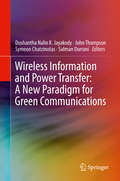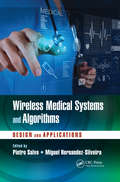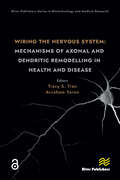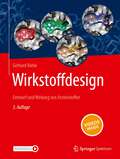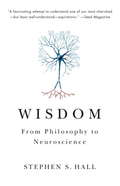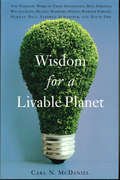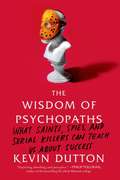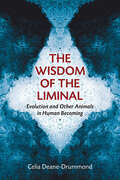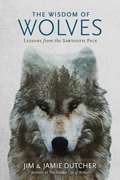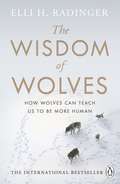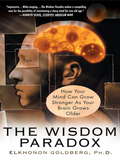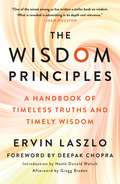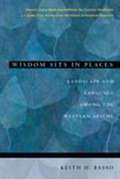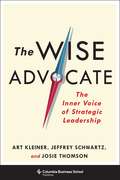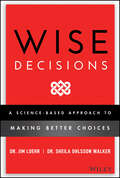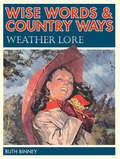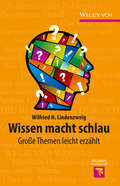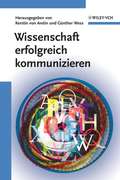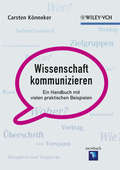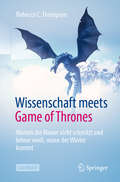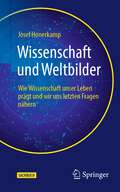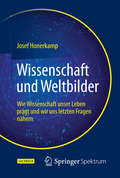- Table View
- List View
Wireless Information and Power Transfer: A New Paradigm for Green Communications
by Salman Durrani Symeon Chatzinotas John Thompson Dushantha Nalin K. JayakodyThis book presents breakthroughs in the design of Wireless Energy Harvesting (WEH) networks. It bridges the gap between WEH through radio waves communications and power transfer, which have largely been designed separately. The authors present an overview of the RF-EHNs including system architecture and RF energy harvesting techniques and existing applications. They also cover the idea of WEH in novel discoveries of information, the theoretical bounds in WEH, wireless sensor networks, usage of modern channel coding together with WEH, energy efficient resource allocation mechanisms, distributed self-organized energy efficient designs, delay-energy trade-off, specific protocols for energy efficient communication designs, D2D communication and energy efficiency, cooperative wireless networks, and cognitive networks.
Wireless Medical Systems and Algorithms: Design and Applications (Devices, Circuits, and Systems #56)
by Pietro Salvo Miguel Hernandez-SilveiraWireless Medical Systems and Algorithms: Design and Applications provides a state-of-the-art overview of the key steps in the development of wireless medical systems, from biochips to brain–computer interfaces and beyond. The book also examines some of the most advanced algorithms and data processing in the field. Addressing the latest challenges and solutions related to the medical needs, electronic design, advanced materials chemistry, wireless body sensor networks, and technologies suitable for wireless medical devices, the text: Investigates the technological and manufacturing issues associated with the development of wireless medical devices Introduces the techniques and strategies that can optimize the performances of algorithms for medical applications and provide robust results in terms of data reliability Includes a variety of practical examples and case studies relevant to engineers, medical doctors, chemists, and biologists Wireless Medical Systems and Algorithms: Design and Applications not only highlights new technologies for the continuous surveillance of patient health conditions, but also shows how disciplines such as chemistry, biology, engineering, and medicine are merging to produce a new class of smart devices capable of managing and monitoring a wide range of cognitive and physical disabilities.
Wiring the Nervous System: Mechanisms of Axonal and Dendritic Remodelling in Health and Disease (River Publishers Series in Biotechnology and Medical Research)
by Tracy S. Tran Avraham YaronThis book examines recent key findings on the mechanisms of axonal and dendritic remodeling in different model organisms. Each chapter is contributed by a panel of experts in their respective subfields of neurosciences, to provide and discuss the latest discoveries ranging from neuronal morphogenesis during development, experience-dependent structural plasticity, to neuronal degeneration, regeneration, and pathologies in neurological disorders. The process of neuronal remodeling, specifically their axons and dendrites, is essential for the proper wiring of the nervous system during early development and continues during postnatal ages to shape the pattern of synaptic connections throughout the life of the organism, including humans. Over recent years, substantial progress has been made in our understanding of the cellular and molecular mechanisms that control neuronal remodeling. In addition, there is accumulating evidence demonstrating how the nervous system could remodel in response to injury and in pathological conditions. Topics discussed in the book include: Axonal degeneration during development and in pathological or disease conditions Neuronal morphogenesis (axons and dendrites) Experience-dependent structural plasticity to synaptogenesis Dendrite degeneration and regeneration
Wirkstoffdesign: Entwurf und Wirkung von Arzneistoffen
by Gerhard KlebeDie vorliegende 3. Auflage bringt das Thema Wirkstoffdesign wieder auf den aktuellen Stand der Forschung. Der Leser lernt neue Methoden in der Gentechnologie und die erweiterte Palette strukturbiologischer Verfahren kennen. Gerade die letzten 10 Jahre wurden durch Einsatz dieser Methoden viele komplexe Zielstrukturen wie die G-Protein gekoppelten Rezeptoren oder Ionenkanälen aufgeklärt. Der Leser erfährt wie diese lange ersehnten Komplexstrukturen mit klassischen Arzneistoffen aussehen und wie die therapeutische Wirkung erzielt wird. Im Wirkstoffdesign ist die räumliche Struktur der interagierenden Moleküle von zentraler Bedeutung. Hier liegt der Schlüssel, warum ein bestimmter Wirkstoff in seiner Gestalt praktisch durch die Geometrie und den Wirkmechanismus des Zielproteins festgelegt wird. Daher wurden die Farbabbildungen in der 3. Auflage neu gestaltet und mit Videos verknüpft, die direkt über QR-Codes neben den Abbildungen mit üblichen Handys oder Tablets ohne weitere App aufgerufen werden. Die bewegten Moleküldarstellungen geben dem Leser einen leichten Zugang zum räumlichen Verständnis der molekularen Strukturen und Interaktionen. Dieses Lehrbuch wurde ursprünglich von Hans-Joachim Böhm, Gerhard Klebe und Hugo Kubinyi begründet und richtet sich an Studierende der Pharmazie, Chemie und der Biowissenschaften, aber auch an Quereinsteiger und Medizinische Chemiker in Forschungs- und Entwicklungsabteilungen der Pharmazeutischen Industrie. Es wurde mit dem Literaturpreis des Fonds der Chemischen Industrie ausgezeichnet. Konzeptionell hebt es sich sehr stark von klassischen Lehrbüchern der pharmazeutischen Chemie ab und rückt den Weg zum neuen Arzneistoff in den Mittelpunkt. Die Auswahl der Fallbeispiele erfolgte nach didaktischen Gesichtspunkten und versucht einen weiten Überblick über Methoden und Strategien zu geben ohne den Blick zurück auf die Anfänge dieses Arbeitsgebiet zu vergessen. So spannt sich der Bogen von der Geschichte der Arzneimittelforschung, den Wirkmechanismen der Arzneistoffe und den Methoden zur Leitstruktursuche und -optimierung über Strukturbestimmungsverfahren, Modelling, Moleküldynamik und QSAR-Methoden bis zum struktur- und computergestützten Design. In der 3. Auflage kommen neue Methoden und Konzepte wie die Epigenetik, der PROTAC-Ansatz, die CRISPR-Cas9-Genschere, Strukturvorhersagen aus der Sequenz, der Einsatz von Künstlicher Intelligenz und neue Screening-Technologien aus der Biophysik zur Sprache. Erfolge beim Stören bzw. Verstärken von Protein-Protein-Wechselwirkungen als Konzept der Arzneistofftherapie werden vorgestellt und Überlegungen zur Optimierung von Arzneistoffen unter Berücksichtigung ihrer thermodynamischen wie kinetischen Bindungsprofile werden diskutiert.Videos per App: einfach die SN More Media App kostenfrei herunterladen, einen Link mit dem Play-Button scannen und sofort das video auf Smartphone oder Tablet ausspiele.
Wirtschaftliches Grundwissen: Für Naturwissenschaftler und Ingenieure
by Hergen Scheck Birgitt ScheckWenn frisch gebackene Absolventen eines natur- oder ingenieurwissenschaftlichen Studienganges in ihr erstes Wirtschaftsunternehmen kommen, landen sie auf einem fremden Planeten: dem der Kaufleute, Betriebswirte, Juristen und Manager. Um dort bestehen zu konnen, ist zumindest ein Grundwissen daruber, wie Wirtschaft funktioniert und geregelt ist, unverzichtbar. Dieser Kompaktkurs fur das moderne Wirtschaftsleben spart nichts aus: Von der doppelten Buchfuhrung bis zur Erschlie?ung globaler Markte - hier wird alles in leicht verstandlichen Begriffen erklart. - Der Crash-Kurs fur Berufsanfanger: Nimmt die Scheu vor dem Umgang mit Geld, Markten und Produkten. Alle Aspekte des Wirtschaftslebens werden dargestellt, ohne unnotigen Ballast und ohne "Fachchinesisch". - Praxisnah: Zahlreiche Fallbeispiele und Ubungsaufgaben zu aktuellen Themen aus dem Wirtschaftleben - mit Losungen im Anhang! Von der Markteinfuhrung eines 3-Liter-Autos bis zur Existenzgrundung als "Ich-AG" werden reale Szenarien erklart und analysiert. - Lesefreundliches Layout: Eine Doppelseite zu jedem Thema, mit klar gekennzeichneten Zusammenfassungen und Beispielen. - Aktuell: Alle Kapitel berucksichtigen jetzt die Anderungen in der nationalen und internationalen Gesetzgebung bis 2006 (z. B. neue Rechtsformen bei Gesellschaften, neue Regelungen beim Kundigungsschutz, Ich-AGs, etc.) - alle Anderungen in den wirtschaftlichen und politischen Rahmenbedingungen der letzten 5 Jahre sind berucksichtigt.
Wisdom: From Philosophy to Neuroscience
by Stephen S. HallA compelling investigation into one of our most coveted and cherished ideals, and the efforts of modern science to penetrate the mysterious nature of this timeless virtue. We all recognize wisdom, but defining it is more elusive. In this fascinating journey from philosophy to science, Stephen S. Hall gives us a dramatic history of wisdom, from its sudden emergence in four different locations (Greece, China, Israel, and India) in the fifth century B. C. to its modern manifestations in education, politics, and the workplace. We learn how wisdom became the provenance of philosophy and religion through its embodiment in individuals such as Buddha, Confucius, and Jesus; how it has consistently been a catalyst for social change; and how revelatory work in the last fifty years by psychologists, economists, and neuroscientists has begun to shed light on the biology of cognitive traits long associated with wisdom--and, in doing so, begun to suggest how we might cultivate it. Hall explores the neural mechanisms for wise decision making; the conflict between the emotional and cognitive parts of the brain; the development of compassion, humility, and empathy; the effect of adversity and the impact of early-life stress on the development of wisdom; and how we can learn to optimize our future choices and future selves. Hall's bracing exploration of the science of wisdom allows us to see this ancient virtue with fresh eyes, yet also makes clear that despite modern science's most powerful efforts, wisdom continues to elude easy understanding.
Wisdom for a Livable Planet
by Carl N. McdanielThe author profiles the work of eight visionaries who have dedicated their lives to various environmental issues. Each story provides a portrait of an individual's valiant and inspiring campaign to improve the conditions for life on our planet. Taken together, the work of these people points the way toward creating an ecologically centered civilization in which a brighter future for all life, including human, is possible.*Terri Swearingen takes on one of the world's largest hazardous waste incinerators burning toxic waste next door to an elementary school.*Stephen Schneider establishes the scientific basis for climate change*Herman Daly advocates a dynamic steady-state economy that respects the laws of nature and human behavior.*David Orr champions educational reform to make universities a place where students learn how to be environmentally aware citizens*Werner Fornos works toward empowering every person with the knowledge and means to decide when and how many children to have*Helena Norberg-Hodge champions local living with appropriate technologies to enhance our spiritual and ecological well-being.*Wes Jackson promotes sustainable agriculture based on local ecology and community values*Dave Foreman leads the effort to rewild almost half of North America with wolves, mountain lions, jaguars, falcons, and others to restore functional ecosystems and preserve biodiversity
Wisdom for a Livable Planet
by Carl N. McdanielThe author profiles the work of eight visionaries who have dedicated their lives to various environmental issues. Each story provides a portrait of an individual's valiant and inspiring campaign to improve the conditions for life on our planet. Taken together, the work of these people points the way toward creating an ecologically centered civilization in which a brighter future for all life, including human, is possible.*Terri Swearingen takes on one of the world's largest hazardous waste incinerators burning toxic waste next door to an elementary school.*Stephen Schneider establishes the scientific basis for climate change*Herman Daly advocates a dynamic steady-state economy that respects the laws of nature and human behavior.*David Orr champions educational reform to make universities a place where students learn how to be environmentally aware citizens*Werner Fornos works toward empowering every person with the knowledge and means to decide when and how many children to have*Helena Norberg-Hodge champions local living with appropriate technologies to enhance our spiritual and ecological well-being.*Wes Jackson promotes sustainable agriculture based on local ecology and community values*Dave Foreman leads the effort to rewild almost half of North America with wolves, mountain lions, jaguars, falcons, and others to restore functional ecosystems and preserve biodiversity
The Wisdom of Psychopaths: What Saints, Spies, and Serial Killers Can Teach Us About Success
by Kevin DuttonIn this engrossing journey into the lives of psychopaths and their infamously crafty behaviors, the renowned psychologist Kevin Dutton reveals that there is a scale of "madness" along which we all sit. Incorporating the latest advances in brain scanning and neuroscience, Dutton demonstrates that the brilliant neurosurgeon who lacks empathy has more in common with a Ted Bundy who kills for pleasure than we may wish to admit, and that a mugger in a dimly lit parking lot may well, in fact, have the same nerveless poise as a titan of industry. Dutton argues that there are indeed "functional psychopaths" among us―different from their murderous counterparts―who use their detached, unflinching, and charismatic personalities to succeed in mainstream society, and that shockingly, in some fields, the more "psychopathic" people are, the more likely they are to succeed. Dutton deconstructs this often misunderstood diagnosis through bold on-the-ground reporting and original scientific research as he mingles with the criminally insane in a high-security ward, shares a drink with one of the world's most successful con artists, and undergoes transcranial magnetic stimulation to discover firsthand exactly how it feels to see through the eyes of a psychopath. As Dutton develops his theory that we all possess psychopathic tendencies, he puts forward the argument that society as a whole is more psychopathic than ever: after all, psychopaths tend to be fearless, confident, charming, ruthless, and focused―qualities that are tailor-made for success in the twenty-first century. Provocative at every turn, The Wisdom of Psychopaths is a riveting adventure that reveals that it's our much-maligned dark side that often conceals the trump cards of success.
The Wisdom of the Liminal: Evolution and Other Animals in Human Becoming
by Celia Deane-DrummondA sophisticated theological anthropology that takes into account evolutionary theories and our relationships to other animals In this book Celia Deane-Drummond charts a new direction for theological anthropology in light of what is now known about the evolutionary trajectories of humans and other animals. She presents a case for human beings becoming fully themselves through their encounter with God, after the pattern of Christ, but also through their relationships with each other and with other animals. Drawing on classical sources, particularly the work of Thomas Aquinas, Deane-Drummond explores various facets of humans and other animals in terms of reason, freedom, language, and community. In probing and questioning how human distinctiveness has been defined using philosophical tools, she engages with a range of scientific disciplines, including evolutionary biology, biological anthropology, animal behavior, ethology, and cognitive psychology. The result is a novel, deeply nuanced interpretation of what it means to be distinctively human in the image of God.
The Wisdom of Wolves: Lessons From the Sawtooth Pack
by Jamie Dutcher Jim DutcherFrom the world-famous couple who lived alongside a three-generation wolf pack, this book of inspiration, drawn from the wild, will fascinate animal and nature lovers alike.For six years Jim and Jamie Dutcher lived intimately with a pack of wolves, gaining their trust as no one has before. In this book the Dutchers reflect on the virtues they observed in wolf society and behavior. Each chapter exemplifies a principle, such as kindness, teamwork, playfulness, respect, curiosity, and compassion. Their heartfelt stories combine into a thought-provoking meditation on the values shared between the human and the animal world. Occasional photographs bring the wolves and their behaviors into absorbing focus.
The Wisdom of Wolves: How Wolves Can Teach Us To Be More Human
by Elli H. Radinger'ENCHANTING' MAIL ON SUNDAY They care for their elderly, play with their kids, and always put family first. Can we all learn something from the wisdom of wolves? In this unforgettable book, wolf expert and naturalist Elli Radinger draws on her 25 years of first-hand experience among the wolves of Yellowstone National Park to tell us their remarkable stories. __________ Wolves are more human than we ever knew . . . In fact, they can teach us how to be better humans. They play, love, care for others, show compassion, die of broken hearts, pine for home, work in teams, are endlessly patient and leaders know when to defer to followers. In The Wisdom of Wolves naturalist Elli Radinger takes us on a journey into the heart of the wolf pack, revealing what they can teach us about family, cooperation, survival, leadership, commitment and how to enjoy what life gives us. No other book will bring you closer to discovering the truth about wolves - and ourselves. 'This book is the result of her two decades of close observation; part impassioned memoir, part natural history study, and part photo gallery. Her access to her subjects is extraordinary' SUNDAY TIMES'Elli's bestselling book suggests that in a high-tech age, when so many of us have become alienated from nature, wolves have much to teach us about the art of living well' DAILY MAIL'Through The Wisdom of Wolves, we get to feel that little bit closer to the pack and discover what we may have in common' BBC WILDLIFE
The Wisdom Paradox
by Elkhonon GoldbergThe Wisdom Paradox explores the aging of the mind from a unique, positive perspective. In an era of increasing fears about mental deterioration, world-renowned neuropsychologist Elkhonon Goldberg provides startling new evidence that though the brain diminishes in some tasks as it ages, it gains in many ways. Most notably, it increases in what he terms "wisdom": the ability to draw upon knowledge and experience gained over a lifetime to make quick and effective decisions. Goldberg delves into the machinery of the mind, separating memory into two distinct types: singular (knowledge of a particular incident or fact) and generic (recognition of broader patterns). As the brain ages, the ability to use singular memory declines, but generic memory is unaffected-and its importance grows. As an individual accumulates generic memory, the brain can increasingly rely upon these stored patterns to solve problems effortlessly and instantaneously. Goldberg investigates the neurobiology of wisdom, and draws on historical examples of artists and leaders whose greatest achievements were realized late in life.
The Wisdom Principles: A Handbook of Timeless Truths and Timely Wisdom
by Ervin Laszlo"By opening this Handbook for wise thinking and living, you open the door to your new identity, because across the threshold there is only the lightness of Being, and infinity in all directions."—Deepak ChopraIn The Wisdom Principles, Dr. Ervin Laszlo, authority in the fields of new science, consciousness, and spirituality, bridges the chasm between our understanding of science and the truths of spirituality, bringing an essential and timely message of wisdom to the world. Laszlo offers readers principles of empowerment that will guide the choices they make for years to come and will allow them to move confidently toward a better future.This book is the distillation of Laszlo’s sixty plus years spent delving into the mysteries of science and a lifetime of keen spiritual insight. The nuggets of timely wisdom offered in The Wisdom Principles, and the timeless truths revealed on its pages, are a precious resource for wise thinking and living. As we stand at a crossroads of civilization there has never been a greater need for them than today. Deepak Chopra, Neale Donald Walsch, and Gregg Braden are among the renowned thought-leaders who lend their voices to Laszlo’s work, framing the book and underscoring the power of its life-changing principles.
Wisdom Sits In Places: Landscapes and Language Among the Western Apache
by Keith H. BassoFour essays recount stories Western Apaches tell about the landscape. Includes comments from a cultural anthropologist.
The Wise Advocate: The Inner Voice of Strategic Leadership (Columbia Business School Publishing Ser.)
by Art Kleiner Josie Thomson Jeffrey SchwartzLeadership is the habit of making good choices. Even in difficult and uncertain circumstances, the most effective leaders focus their attention and overcome entrenched patterns of behavior to push an organization to new heights of success. This capability is no fluke: the latest research on the brain shows that we can pinpoint the mental activity associated with it—and cultivate it for our benefit.In this book, Art Kleiner, a strategy expert; Jeffrey Schwartz, a research psychiatrist; and Josie Thomson, an executive coach, give a transformative explanation of how cutting-edge neuroscience can help business leaders set a course toward better management. Mapping the functions of a manager onto established patterns of mental activity, they identify crucial brain circuits and their parallels in organizational culture. Strategic leaders, they show, play the role of wise advocates: able to go beyond day-to-day transactional behavior to a longer-term, broader perspective that articulates their organization’s deeper purpose. True leaders can play this influencer role in an organization because they have cultivated similar self-reflective habits in their own minds. Providing a powerful guide to decision strategies and their consequences, The Wise Advocate helps managers find their own inner voice and then make that voice ring out loud and clear, with a four-step program for practice and catalytic implications for management strategy, executive education, and business results.
Wise Decisions: A Science-Based Approach to Making Better Choices
by James E. Loehr Sheila Ohlsson WalkerA concrete and hands-on method for improving your everyday decisions Every 15 minutes, each of us can make ten or more small decisions. Some of them are relatively inconsequential, while others can change the course of our lives. What if you could improve all of your decisions, across the board, and start to build a healthier, more productive, and meaningful life? In Wise Decisions: A Science-Based Approach to Making Better Choices, a team of accomplished industry experts delivers an evidence- and research-based blueprint for making the best decisions you can with the information you have. You’ll learn to make the targeted, repeated investment of energy required to turn your decision-making process into one informed by reason, emotion, intuition, and science. In the book, you’ll discover: How to put the decision-making process under a microscope and learn what makes a decision truly wise Ways to help children, teens, and families make wise decisions How to train yourself to make wise decisions with voice training and other strategiesA can’t-miss resource for parents, teachers, coaches, managers, executives, and other business leaders, Wise Decisions also offers timeless advice and guidance for anyone else hoping to improve the decision-making abilities of the people close to them.
Wise Words & Country Ways Weather Lore
by Ruth BinneyAn enthralling book that not only satisfies our fascination for lost wisdom of our ancestors but also indulges the British obsession with the weather. Probably the best known country saying of them all is 'red sky at night, shepherd's delight'. Wise Words and Country Ways Weather Lore presents us with dozens more similar, but largely now forgotten, words of wisdom that are imbued with a centuries-old understanding of the patterns of British weather, seasonal changes and the behavior of plants and animals around us. It has highly relevant content for an age where we all feel we have lost touch with the patterns of nature.
Wissen macht schlau: Grosse Themen leicht erzählt (Erlebnis Wissenschaft)
by Wilfried H. LindenzweigWarum haben Medikamente Nebenwirkungen? Wie gefährlich ist Strahlung? Wieso können wir mit einer wertlosen Plastikkarte Dinge bezahlen? Wie könnten Außerirdische aussehen? <P><P>Diesen und vielen weiteren Fragen widmet sich Wilfried Lindenzweig aus Sicht des Naturwissenschaftlers.
Wissenschaft erfolgreich kommunizieren
by Wissenschaft Erfolgreich Kommunizieren"Endlich bekommen wir Wissenschaftler nicht nur einen Spiegel vorgehalten, sondern auch Einblick in die Welt der Journalisten und derjenigen, die uns helfen konnen, uns verstandlich zu machen. Das Buch macht nicht nur die Notwendigkeit sehr deutlich, dass wir anderen Menschen oder Gruppen unser Tun erklaren mussen, es bringt einem auch nahe, wie es gehen konnte. Pflichtlekture fur uns Wissenschaftler". Prof. Dr. Dr. Uwe Bicker, "Vorsitzender des Marburger Universitatsbundes" "Erfolgsfaktoren der Wissenschaftskommunikation" ist ein wichtiges Buch. Das Feld der Wissenschaftskommunikation existiert naturlich schon langer, allerdings eher im stillen und ohne so benannt zu sein. Hier wird es zum ersten Mal umrissen und gewinnt Kontur. Im Grunde macht das Buch deutlich, dass eine neue Kommunikationsdisziplin entstanden ist, die auf theoretische wie praktische Aufarbeitung wartet. Es ist endlich mal kein Buch mit einem "how-to-do" Ansatz, sondern befordert durch ungewohnliche Einblicke und Gedanken eigene Reflexionen zum professionellen Managen der Kommunikation uber und mit Naturwissenschaften. " Dr. Holger Sievert, Project Director des Qualifizierungsprogramm !communicate! der Bertelsmann Stiftung, Heinz Nixdorf Stiftung, DaimlerChryslerFonds und TU Munchen "Das Buch macht auf anschauliche und unterhaltsame Weise deutlich: Kommunikation ist unbestreitbar ein zentrales Element in der Arbeit jedes Wissenschaftlers. Sie wird in der Abfolge der Wertschopfungskette von der Grundlagenforschung bis hin zum Produkt zunehmend wichtiger und muss deshalb auch bewusst gestaltet werden. Wissenschaftler, Kommunikationsmanager und Journalisten erfahren hier mehr uber den Prozess, seine Regeln und Akteure." Prof. Dr. Peter Gruss, Prasident der Max-Planck-Gesellschaft Dieser Sammelband enthalt viele interessante Beispiele dazu, wie heute Wissenschaft in eine breite Offentlichkeit kommuniziert wird. Die Sammlung von Beitragen aus unterschiedlichstem Blickwinkel - von Journalisten, Wissenschaftlern und Unternehmenskommunikatoren - ist der spezifische Mehrwert, der dieses Buch auszeichnet. Wolfgang Hess Chefredakteur bild der wissenschaft
Wissenschaft kommunizieren: Ein Handbuch mit vielen praktischen Beispielen
by Carsten KönnekerDas Buch ist eine systematische Einführung in die Praxis guter Wissenschaftskommunikation. Anhand zahlreicher Beispiele erklärt es, wie Wissenschaftler, Öffentlichkeitsarbeiter und Journalisten unterschiedliche Zielgruppen über Forschung informieren können und dabei die wichtigsten medialen Formate nutzen: Meldungen, Artikel, Kommentare, Vorträge, Interviews, soziale Netzwerke, Weblogs usw. Aus dem Inhalt: - Allgemeine Regeln für gutes Formulieren - Praxis guter Wissenschaftskommunikation: Überschrift, Vorspann, Bildunterschrift, Metaphern usw. - Spezielle mediale Formen: Meldungen, Kommentare, Rezensionen, Vorträge, Interviews usw. - Wissenschaftskommunikation per Internet: Blogs, soziale Netzwerke, die persönliche Webseite - Ausblick: 10 Thesen zur Zukunft der Wissenschaftskommunikation
Wissenschaft meets Game of Thrones: Warum die Mauer nicht schmilzt und keiner weiß, wann der Winter kommt
by Rebecca C. ThompsonSie sind Game of Thrones-Fan und haben sich schon immer gefragt, warum in Westeros keiner weiß, wann der Winter eigentlich kommt? Wie Drachen Feuer spucken können? Was die weißen Wanderer am Leben hält und warum die Mauer nicht einfach wegschmilzt? Kurzweilig und mit viel Humor liefert Ihnen Rebecca Thompson in diesem Buch Antworten auf diese und viele weitere spannende Fragen, indem sie mit wissenschaftlichem Blick die fantastische Welt von Game of Thrones erforscht: Sie werden erstaunt sein, wieviel „echte Physik” man bei der Untersuchung der Stabilität und Zusammensetzung der Mauer lernen kann – oder hätten Sie gewusst, dass normales Eis sich wie Ketchup verhalten kann? Auch den scheinbar unvorhersehbaren Jahreszeiten, der Herstellung von valyrischem Stahl und natürlich dem Leben und der Liebe in Westeros wird wissenschaftlich auf den Zahn gefühlt. Nach der Lektüre dieses Buches wissen Sie nicht nur, dass Drachen am Ende eigentlich nur große, feuerspeiende Fledermäuse sind, sondern auch, welcher Zusammenhang tatsächlich zwischen der genetischen Vielfalt der Familien Targaryen und Lennister und deren geistiger Gesundheit besteht. Frei nach dem Motto „Valar Morghulis” darf am Ende auch eine differenzierte wissenschaftliche Betrachtung der vielfältigen Todesarten, von denen die Protagonisten der Serie ereilt werden, nicht fehlen - vom Gift bis zur goldenen Krone. Aber Achtung: Spoiler! Fans der Serie und auch alle anderen, die Spaß an Naturwissenschaft und Fantasy haben, werden durch Thompsons amüsante und unterhaltsame Erklärungen viele spannende und neue Dinge über unsere reale wie auch über die Welt von Game of Thrones erfahren. Dies Buch ist damit ein unverzichtbarer Begleiter für den nächsten Serienmarathon – denn der nächste Winter kommt bestimmt!Mit einem Vorwort von Sean Carrol
Wissenschaft und Weltbilder: Wie Wissenschaft unser Leben prägt und wir uns letzten Fragen nähern
by Josef HonerkampOb wir es wollen oder nicht, die Wissenschaft bestimmt unser Weltbild und unser tägliches Leben auf allen Ebenen. Sie durchdringt unsere Art zu denken und wirft unablässig neue Fragen auf. Wie immer man dazu steht, es lohnt sich, diesen mächtigen Faktor in unserem Leben einmal genauer unter die Lupe zu nehmen.Josef Honerkamp stellt sich als Physiker den großen Fragen rund um Wissenschaft und Weltbilder. Auf unterhaltsame Weise und in kompakten Kapiteln führt er den Leser durch die spannendsten Fragen unserer Zeit und gibt darauf Antworten aus physikalischer Sicht.Warum fachsimpeln Wissenschaftler?Und gesetzt, wir verstünden die Terminologie: können wir die Ergebnisse dann mit unseren Alltagsvorstellungen vereinen?Wie steht es mit der Religion? Was unterscheidet wissenschaftliche von religiösen Denkgebäuden? Können die aus wissenschaftlichen Erkenntnissen entstandenen Maschinen eines Tages den Menschen kopieren - denken sie so wie wir? Welche Formen des Denkens gibt es eigentlich?Wie entwickeln sich Wissenschaften - was hat es mit den Revolutionen in den Wissenschaften auf sich? Und was verbirgt sich hinter der Suche nach einer Weltformel? Die vorliegende 2. Auflage ist vollständig durchgesehen und deutlich erweitert, u.a. zu Schicksalen wissenschaftlicher Theorien und zu dem für das Verständnis von Wissenschaftsgeschichte und -Philosophie sehr relevanten Unterschied zwischen Theorien und Modellen. Der Autor erklärt verständlich und fundiert, wie Wissenschaft funktioniert.
Wissenschaft und Weltbilder: Wie Wissenschaft unser Leben prägt und wir uns letzten Fragen nähern
by Josef HonerkampOb wir es wollen oder nicht, die Wissenschaft bestimmt unser Weltbild und unser tägliches Leben auf allen Ebenen. Sie durchdringt unsere Art zu denken und wirft unablässig neue Fragen auf. Wie immer man dazu steht, es lohnt sich, diesen mächtigen Faktor in unserem Leben einmal genauer unter die Lupe zu nehmen.Josef Honerkamp stellt sich als Physiker den großen Fragen rund um Wissenschaft und Weltbilder. Auf unterhaltsame Weise und in kompakten Kapiteln führt er den Leser durch die spannendsten Fragen unserer Zeit und gibt darauf Antworten aus physikalischer Sicht.Warum fachsimpeln Wissenschaftler?Und gesetzt, wir verstünden die Terminologie: können wir die Ergebnisse dann mit unseren Alltagsvorstellungen vereinen? Wie steht es mit der Religion? Was unterscheidet wissenschaftliche von religiösen Denkgebäuden? Können die aus wissenschaftlichen Erkenntnissen entstandenen Maschinen eines Tages den Menschen kopieren - denken sie so wie wir? Welche Formen des Denkens gibt es eigentlich?Wie entwickeln sich Wissenschaften - was hat es mit den Revolutionen in den Wissenschaften auf sich? Und was verbirgt sich hinter der Suche nach einer Weltformel?
Wissenschaft und Willensfreiheit: Was Max Planck und andere Forschende herausfanden
by Stephan SchleimUnsere Entscheidungen treffen wir selbst und frei. Oder nicht? Für unser Menschenbild ist wenig so bedeutend wie die Erfahrung, sich selbst unter Kontrolle zu haben. Doch was sagen Philosophie und Wissenschaft hierzu?Schon lange vor der Diskussion der Willensfreiheit in der Hirnforschung war man sich dieses Problems bewusst. Stephan Schleim nimmt hier den Vortrag des bedeutenden Physikers und Nobelpreisträgers Max Planck aus den 1930er Jahren zum Anlass, das Thema neu zu beleuchten. Dabei steht im Fokus, wie unsere tatsächlichen Entscheidungen in Alltagssituationen beeinflusst werden. Damit hebt sich das Sachbuch von anderen Veröffentlichungen ab, die nur Laborexperimente mit begrenzter Aussagekraft behandeln.Der Autor erklärt das Problem aus den Perspektiven von Psychologie, Neurowissenschaften, Philosophie, Rechtswissenschaften und Physik. Am Anfang werden Grundlagen vermittelt: Was hat es mit der Diskussion von Determinismus/Indeterminismus auf sich? Welche Begriffe von Willensfreiheit gibt es in der Philosophie? Wie werden Entscheidungen in der Psychologie untersucht?Nach Analyse der einschlägigen Forschung bespricht Stephan Schleim, Assoziierter Professor für Theoretische Psychologie, die praktische Dimension des Problems. Wie und warum machen wir Menschen für ihre Entscheidungen verantwortlich? Wie funktionieren Strafrecht und Moral? Und vor allem: Wie werden wir unbewusst beeinflusst und welche Möglichkeiten haben wir, damit umzugehen?
